#but I obviously do not agree with it
Text
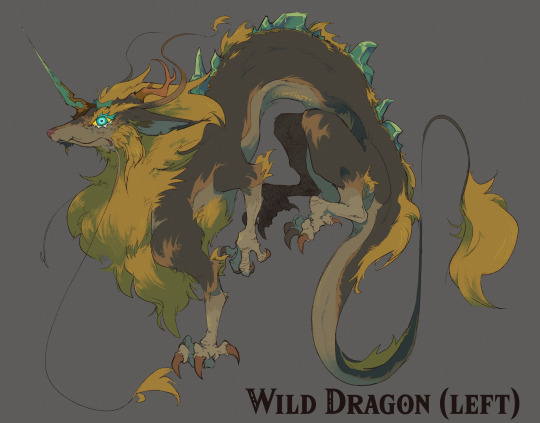
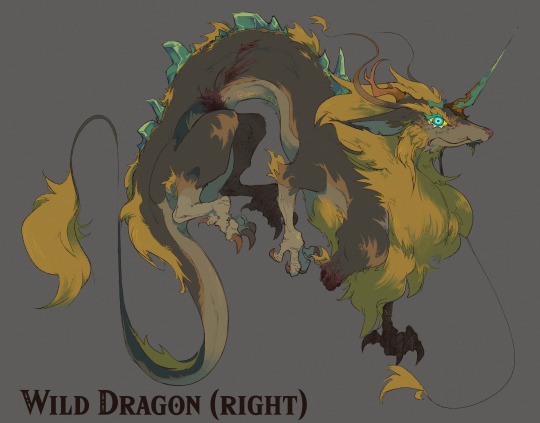
(click for higher quality!) draconified link concept ive been chipping away at this past week ..... here's my funny little compendium concept for him:
"A heroic spirit has taken the form of this bestial dragon. Unlike it's kin, this creature exhibits an extremely aggressive disposition. It appears highly territorial, and will relentlessly chase down those who disturb its skywide patrols - of which it seems to be endlessly searching for either a long-time vassal or foe. Unfortunately, it seems the spirit within has long since forgotten exactly who it was looking for…"
#now. how on earth do i begin to tag this. um.#link#loz#totk#totk spoilers#light dragon#dragon link#loz au#totk roleswap au#there . i'll add more if they come to me LOL#um i can talk about some of my insps i guess?? might make another post too#so mostly i just dont really like turning him into 'light dragon but male' and giving him slightly darker colours or something like that#this also obviously isnt exactly like the botw dragons either though and its a bit more of a mix of other creature concepts i enjoy#since everyone agrees he'd have a farosh horn i wanted to make him a kirin/unicorn :) which is why his tail looks like that#aside from the obvious eastern dragon insps and what ive picked and chosen from the botw dragons#and obviously this looks a lot like wolf link. thats on purpose#i wanted to give him some fierce deity design refs too but because this is so dark/earthy they didnt look very fitting#but honestly you could do a whole fierce deity dragon design on its own i think#okay lots of tags but IVE THOUGHT ABOUT THIS FOR A WHILE. okay. let me have this.#my art
4K notes
·
View notes
Text
put some respect on taika's name.
there aren't many acting performances that have actually made me scared but taika in that storm sequence? the murder suicide scene? confronting frenchie? gravy basket? i was nervous!! this is genuinely one of his best performances to! date! i have seen him act in many things and i am not messing around when i say that this man a fantastic fucking actor.
taika can do scary talented things and i am so fucking tired of it being overlooked. give that man some respect, without him that show is nothing and you all know that
#i am not easily impressed but shit man#this guy made me actually scared#obviously it was supposed to look like that but he looked so insane#i was on the EDGE! OF! MY! SEAT!#do not mention palestine. this is not about that and i do not agree with him signing that fuckass letter#this is about his artistic talent#taika waititi#ofmd#our flag means death#ed teach#edward teach
496 notes
·
View notes
Text
Anyways i also think that Chuuya SHOULD NOT be the Port Mafia boss to be totally honest witchu. If his entire experience with the Sheep, and the way he cracked under pressure as the interim leader during cannibalism, and like, THE BEAST EPILOGUE, had anything to say it's that Chuuya's not fit to be the leader of an organization such as that.
Bc Chuuya's good at adapting, he's good at spur of the moment decisions. He's good with battle tactics. We see his actual leadership abilities shine when he's commanding the mafia troops to protect the city during the guild arc. In cannibalism, his plan to rush the ADA with a full frontal attack was a SOLID idea. But he loses his advantage as soon as he hesitates and opens the table for negotiation instead.
BECAUSE Chuuya's not good at playing the long game like Mori or Dazai. He's reactionary and it's his nature to get overwhelmed by his emotions. He takes on too much responsibility but loses focus due to personal reasons. That what happens in 15 where he blows off the Sheep to go on a life changing field trip with Dazai. That's why he was taken out of the picture so easily to go on a life changing field trip with Ranpo in Cannibalism. (Damn maybe this is why he's on a life changing field trip with Fyodor as a vampire currently).
Essentially even though Asagiri has been really tying Chuuya's character with the themes of leadership, we've mostly been shown why he wouldn't be a good fit. Either this plot point will trend towards Chuuya actually learning how to be a good leader OR he won't end up as one. IN ANY CASE what we know abt Chuuya makes me really think that being the Port Mafia's boss is a terrible idea. He's not fit for the role and frankly, I think he'd hate it.
#another interesting thing: kunikida and chuuya are obviously made to be foils.#and the two of them are currently set up to be the next leaders of their respective organization BUT#were consistently shown that when they ARE in that position they can't handle the pressure#they both crack under stress. they both act self sacrificial.#Kunikida is agreed by everyone to be the agency's next president but tbh i think that's also a TERRIBLE IDEA.#kunikida forces himself to fit a standard. making him the agency's president is only doubling down on a damaging self opinion i think#and honestly i think ranpo would be a good fit for the next leader tbh. thats another story#bsd#meta i guess?#i might expand on the kunikida thing later#ALSO wtf does chuuya DO as an executive?? WHATS HIS ROLE???
2K notes
·
View notes
Note
niceys positive anon!! i don't agree with you on everything but you are so clearly like well read and well rounded that you've helped me think through a lot of my own inconsistencies and hypocrises in my own political and social thought, even if i do have slightly different conclusions at times then u (mainly because i believe there's more of a place for idealism and 'mind politics' than u do). anyway this is a preamble to ask if you have recommended reading in the past and if not if you had any recommended reading? there's some obvious like Read Marx but beyond that im always a little lost wading through theory and given you seem well read and i always admire your takes, i wondered about your recs
it's been a while since i've done a big reading list post so--bearing in mind that my specific areas of 'expertise' (i say that in huge quotation marks obvsies i'm just a girlblogger) are imperialism and media studies, here are some books and essays/pamphlets i recommend. the bolded ones are ones that i consider foundational to my politics
BASICS OF MARXISM
friedrich engels, principles of commmunism
friedrich engels, socialism: utopian & scientific
karl marx, the german ideology
karl marx, wage labour & capital
mao zedong, on contradiction
nikolai bukharin, anarchy and scientific communism
rosa luxemburg, reform or revolution?
v.i lenin, left-wing communism: an infantile disorder
v.i. lenin, the state & revolution
v.i. lenin, what is to be done?
IMPERIALISM
aijaz ahmed, iraq, afghanistan, and the imperialism of our time
albert memmi, the colonizer and the colonized
che guevara, on socialism and internationalism (ed. aijaz ahmad)
eduardo galeano, the open veins of latin america
edward said, orientalism
fernando cardoso, dependency and development in latin america
frantz fanon, black skin, white masks
frantz fanon, the wretched of the earth
greg grandin, empire's workshop
kwame nkrumah, neocolonialism, the last stage of imperialism
michael parenti, against empire
naomi klein, the shock doctrine
ruy mauro marini, the dialectics of dependency
v.i. lenin, imperialism: the highest stage of capitalism
vijay prashad, red star over the third world
vincent bevins, the jakarta method
walter rodney, how europe underdeveloped africa
william blum, killing hope
zak cope, divided world divided class
zak cope, the wealth of (some) nations
MEDIA & CULTURAL STUDIES
antonio gramsci, the prison notebooks
ed. mick gidley, representing others: white views of indigenous peoples
ed. stuart hall, representation: cultural representations and signifying pratices
gilles deleuze & felix guattari, capitalism & schizophrenia
jacques derrida, margins of philosophy
jacques derrida, speech and phenomena
michael parenti, inventing reality
michel foucault, disicipline and punish
michel foucault, the archeology of knowledge
natasha schull, addiction by design
nick snricek, platform capitalism
noam chomsky and edward herman, manufacturing consent
regis tove stella, imagining the other
richard sennett and jonathan cobb, the hidden injuries of class
safiya umoja noble, algoriths of oppression
stuart hall, cultural studies 1983: a theoretical history
theodor adorno and max horkheimer, the culture industry
walter benjamin, the work of art in the age of mechanical reproduction
OTHER
angela davis, women, race, and class
anna louise strong, cash and violence in laos and vietnam
anna louise strong, the soviets expected it
anna louise strong, when serfs stood up in tibet
carrie hamilton, sexual revolutions in cuba
chris chitty, sexual hegemony
christian fuchs, theorizing and analysing digital labor
eds. jules joanne gleeson and elle o'rourke, transgender marxism
elaine scarry, the body in pain
jules joanne gleeson, this infamous proposal
michael parenti, blackshirts & reds
paulo freire, pedagogy of the oppressed
peter drucker, warped: gay normality and queer anticapitalism
rosemary hennessy, profit and pleasure
sophie lewis, abolish the family
suzy kim, everyday life in the north korean revolution
walter rodney, the russian revolution: a view from the third world
#ask#avowed inframaterialist reading group#i obviously do not 100% agree with all the points made by and conclusions reached by these works#but i think they are valuable and useful to read
928 notes
·
View notes
Text
The bourgeois or "exploiting class" doesn't inherently include the person who gets their nails done biweekly, or the disabled person who has a carer, or the guy who got a $70 video game for full-price, or the person who relies on medication (yes even the ones you don't think they "need"), or anything else like this. None of these people will, on average, have the ability to exploit workers by means of ownership or whatever.
While you are busy fighting with fellow workers, you are still being exploited by your boss, by capitalism, by (potentially) not having healthcare, by being overworked and underpaid, and so are they.
#politics#feel like this wording isn't satisfactory for me but fuck it we ball#used bourgeois because i think as a colloquial word it's recognized but like...#...i dunno i think some people use it to mean 'person who can do [x]' even if they quite literally own no means of production#like the idea that you're exploiting a worker by agreeing to a service they provide isn't what bourgeois means#if i paid a carer to care for a disabled person they aren't being exploited by that disabled person...#...HOWEVER that carer absolutely can (and probably will be) exploited by the systems of power (eg their boss or capitalism)#perhaps it's too late at night for me to be posting about this but it's something that bothers me!#*especially* when it comes to disability and other groups already exploited by marginalization 👍#if your leftism percludes the disabled (including the terminally and profoundly) or the elderly or the queer or so so much i don't WANT ITTT#saw a disabled person i follow lament how afraid they were to have a carer out of fear of Being a Bad Exploitative Person#and they obviously need one and that makes me so fucking angry to know that they are needlessly suffering
579 notes
·
View notes
Text
A rant under cut that people may not agree with idk sorry i just need to get it out
Sorry i’m home from work now and not done yet another reason why I’m actually pissed off is that George is being treated so fucking badly that obviously people, me included, are going to feel fucking bad for him and hope he’s alright. He shouldn’t have anyone feeling bad for him as HE fucked up, however the reaction is SO FUCKING SEVERE and does not match up AT ALL to what happened that obviously people are going to be like ??? what the fuck.
Crazy ass death threats with tens of thousands of likes, doxxed to the moon and back, removed from Vidcon’s creator list, edited out of Nolan’s video and removed from the Feastable’s IG post, everyone and their mother “taking a stand” against him to make themselves look better, friends unfollowing and deleting any trace of him from their accounts. Like. You would think he did something way fucking worse than what he did. And that’s not even something we should be thinking about!!! Because what matters is that he hurt Caiti!!!! And yet he’s being treated worse than fucking Wilbur! and Illumina! and even PUNZ!!! who has worse fucking allegations against him.
The reaction is not that of people who care about Caiti, or of people who care about victims, or of those who genuinely believe he’s a bad person. This is the reaction of people who just want him to fucking kill himself because they’ve always hated him and his friends and it’s not NORMAL!!!!
#i cant fucking deal with braindead fucking idiots like#giving him a ‘punishment’ way fucking worse than the behaviour deserves is obviously goikg to make people defend him and feel fucking bar#bad#why cant people be fuvking Normal and agree he should apologise to her and own up to it and fucking#idk#declare that hes going to be fuckimg trying his damn best to improve#and then move on#discourse#what do i tag this with#george situation#?#anyway
210 notes
·
View notes
Text
there are so many things i could scream about the watcher situation because i'm So upset but i think i can summarise it through a comment i saw on The Video that said something like "we didn't care about anything more than text on a black background. all we wanted was You" and. yeah.
#ramble#already did my venting on twitter#but i will say again: how did shane 'fuck capitalism and eat the rich' madej agree to this#obviously i'm not in any of their heads but he did not look happy in that video#whose idea was this and are they stupid#it was fine when it was just some guys in a room occasionally going to a Building!!! it was FINE#it didn't need anything else#shane take puppet history and run#so i'll never do any more buzzfeed unsolved AUs i guess#rip
254 notes
·
View notes
Note
Hear me out…Meta Knight and Starstruck
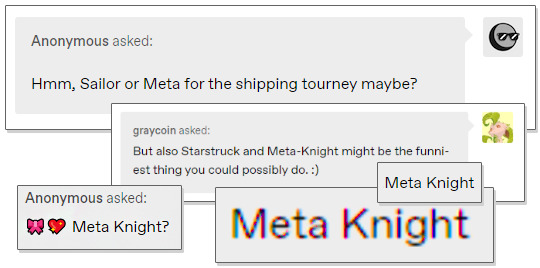
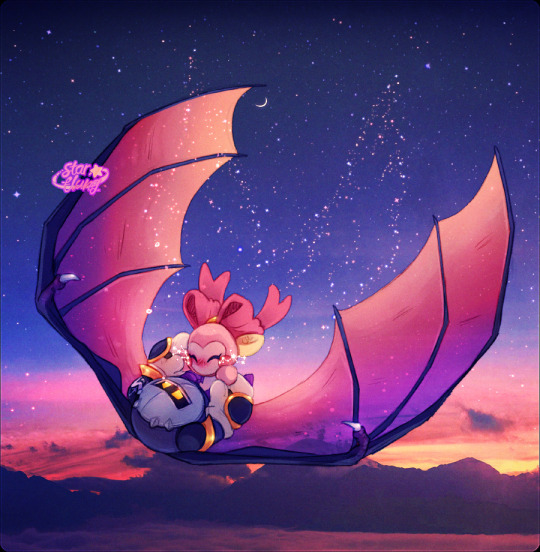
✧˖°.✧ gravity ✧˖°.✧
ɡravɪti (noun)
1. the force that attracts a body towards the centre of the earth or towards any other physical body having mass
2. the degree of intensity of gravity, measured by acceleration
3. extreme importance; seriousness
4. solemnity of manner
#🎀💖#🎀🔍#meta knight#starstruck dee#my art#“might be funny” i agree!! and yet!! somehow i took it deadly serious!! uhhh..... sorry#wrapping up the month with the most popular prompt. they were tied then meta knight overtook sailor dee right at the end#(i guess coz i did sailor's earlier?) i'll still be doing others but i'm obviously a bit behind schedule sorry!#uhm.... haha.#bit of a ribbonemoji workout on this one.#i'm too attached to the pretentiousness of my caption (🔍🔍🔍) to add this to the main post & i'll come back to this later...#but in my worldbuilding Celestials have a behaviour called Sky Dancing. looks a lot like this. bird understanders pspspsps. iykyk#and as always: “is this one canon?” HHHHMMRR. i'm not sure yet. can i say that? i'm still deciding. this one is imo most feasible#at least as something with any actual Romantic Coding. has the kind of rivals > friends > lovers plotline as well which is always fun.#but i think they have to be stupid for a long time before they'd get *here*....#and i'm just not sure they'd have the chance before ███████ ██████ █████ ██ ████ ███.
202 notes
·
View notes
Text


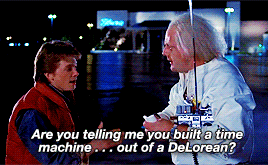
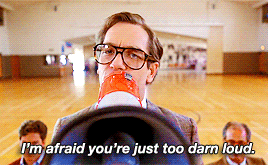
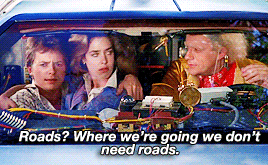

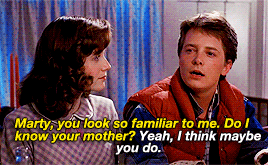



Movies That Made Me: Back to the Future (1985)
#filmedit#bttfedit#motionpicturesource#80sdaily#back to the future#moviesmademe#gifs: movies#*#this had to be the first pick for this meme#i saw this on a class trip in fifth grade and it changed my perception of movies#obviously it's considered one of the best films ever made with one of the most perfect scripts ever and honestly? i agree#biff still being in their lives at the end is weird af but i get why the writers did it#i have known this script word for word since i was probably 14. even rewatching it for this gifset i was just mouthing the words#my hot take in the ~fandom is that there never has been and never will be anyone who can play marty except for mjf#one of the reasons (aside from the music being atrocious) that i do not like the musical#“back to the future made me a feminist” essay also sums up my thoughts perfectly#the CINEMATIC EXPERIENCE that is earth angel bleeding into the score during the kiss#crispin glover's heel turn from fear into courage during the car scene is one of my favorite performances in any movie#we do not give him enough flowers i fear
312 notes
·
View notes
Text
Hot take but I think what we saw in chapter 13 was necessary.
I don't think a lot of people realize how important it is for Araki to portray what he did, even if it extremely difficult to take in. Let me explain.
Araki has discussed about topics like racial and class disparity through both Steel Ball Run and Jojolion, but JOJOLands is different because the discussions are now very direct. We had Chapter 1 open up with police brutality and Chapter 13 open with intense bullying; both acts were committed by people of higher social standing/power and seemingly White (or white passing) and both are harming a dark-skinned queer individual. Not only that, remember that Hawai'i is an island stolen and colonized by the US and many indigenous individuals who were supposed to live and maintain kapu are being forced to endure housing problems, loss of culture, etc. due to gentrification and exploitation of its lands. 2020 was when we saw global protest towards the deaths of George Floyd and Breonna Taylor due to police brutality, which has spread as far as Japan in terms of demonstrations and rallies. Araki has made it clear that he tries to take real world experience into his writing, and this is no different. He is also no stranger to portraying law enforcement throughout his parts without glorifying or downplaying their behavior.
As a mutual of mine (who themselves identify as a black GNC individual based in US) has put it, those who identify or even appear as Black while identifying as trans-femme or women are subjected to some of the worse kinds of oppression possible in America. Queer women of Color are one of the most susceptible to sexual violence-- especially when they are young, and the darkness of their skin really plays into it. This is transmisogynoir; it is a hard pill to swallow and acknowledge, even if it feels excessive, and its a multilayer of oppression that connects a person's racial identity, gender, and sexuality as targets of discrimination. It's the fact that one is POC, a woman, AND queer that makes one a target--- not just one or the other. You can’t turn a blind eye to this because it happen constantly throughout America's history and American society even today, but you can't simply water it down or downplay it. In fact, many victims of transmisogynoir have no choice but to downplay their experiences because of their Black identities or because they appear too dark to be taken seriously; when they, especially if they are Black, try to hold people in power accountable, these individuals are suddenly labeled aggressive, indignant, etc. and they are further discriminated for attempting to speak up. Dragona downplaying the bullying isn't them just trying to avoid further conflict but a reflection of how many who were in similar situations like Dragona are forced to simply forgive and forget the trauma they have to endure. To downplay it ourselves is reinforcing the narrative that individuals like Dragona in real life should remain silent and endure their harassment rather than rightfully protect themselves and others from it.
Another thing to add is that the way Japan portrays and treats the LGBTQ community, particularly the trans community. In Japan, the process to legally change your gender is complicated and requires a lot of steps that include, but not limited to, being diagnosed with gender identity disorder, proving you have no kids/guardianships, and sterilization. This causes a lot of individuals to be forced to quickly transition as a means of getting their gender recognized, which takes away the time to let them explore at their own pace, and this is due to how the process can lead to hindering career and life opportunities that wouldn't be hindered had they already transitioned or stayed closeted. Many Japanese trans individuals unable to go through the process quickly either remain closeted or move away from Japan to transition at their own pace. So, as a result, the trans community and its struggles is not as noticed compared to outside of Japan. Another thing to add is that the trans community in Japanese media is often portrayed as comedic relief or a gag. Oftentimes, the trans character or character who diverts from gender conformity (i.e cross-dressing, acting more flamboyant) is the butt of the jokes. Some thing to note is that, when Dragona was first introduced, a lot of people thought that Araki put Dragona in simply for comedic purposes. I had people joke about how Dragona is just there because they believed Araki is trolling. Not only that, the racial issues that Japan has often results in jokes towards non-Japanese individuals in media, especially if they are of darker skin color.
So, Araki putting Dragona in these difficult situations is also meant to subvert expectations that his Japanese, and possibly Western, audience may be expecting. The expectation was to laugh and toss Dragona aside as a single-dimensional character, but Araki instead forced us to face the trauma through Dragona's experience head-on. We are made aware of Dragona's situation, how real and difficult the struggle is, and we end up emphasizing with it rather than laughing at it. Through this, we get a glimpse into real life experiences of trans POCs without it being downplayed and have it show how Dragona is a fleshed-out character with importance to the series. As some have put it, this chapter proved that Dragona isn't just a side character but arguably a complex individual on the same level of importance as Jodio. I don't think it would have been easy to have the same impact if another approach was taken.
While talking to others who identify as trans and/or GNC about their thoughts on the chapter, I was told by many of them that, while Dragona's experience hits close to home and was hard to digest, they appreciate seeing it being expressed and hope it will help other people understand their struggles. One noted how the introduction of Smooth Operators with the backstory as empowering, seeing the Stand as a symbol of surviving the trauma that comes with trans discrimination. I do find this a bit telling with how many people online who are against Araki's portrayal barely mention what trans/GNC people have said about it.
My main concern, as well as what I see people have rightfully critiqued, is the excessive trauma reinforcing the fetishization and violent voyeurism towards trans individuals; it also reinforces the problematic narrative that dysmorphia can only happen as a result of trauma and the trans experience can only be full of pain. There's also the issue that Dragona's experience also happened while they were under age and their harassment is similar to that of Lucy. It's a common trope in Western media to put marginalized people into these situations while upping the ante simply for clicks and pleasure, and even worse when the character portrayed is a minor. As I reiterate, it is a very uncomfortable chapter to read and I don't find it enjoyable at the slightest. Just because I understand why it is necessary doesn't mean I condone the approach done. I also understand Araki as a Japanese man can only relate and portray a queer American's experience to an extent. But, at the same time, the exposure was necessary because it gives us the awareness and a voice to trans people that is lacking within media even today. We need to be aware and acknowledge what our BIPOC trans community goes through as a means of being better humans--- and especially our younger community members. We need to make our society safer for them so they can thrive and have the respect they deserve. Oftentimes, that starts with how they are portrayed and how their experiences are portrayed. While it is still a journey and not every representation will be perfect, we can't simply toss it aside and bash those who try to show something realistic just because it is uncomfortable.
I only hope that Araki wrote Dragona and these scenes as a result of doing extensive research and reaching out to actual POC queer individuals, particularly transfemmes/women, to understand their experiences and have their blessings to use their words to shape Dragona. I feel like that would show that Araki was serious about discussing these issues through his characters rather than simply using Dragona's traumatic experience it for entertainment. I have higher expectations for Araki now, knowing that it may not be the last time he shows a character experience harassment and possibly have Dragona be harassed again, so I will keep my eyes open for this.
#the jojolands#this is my first time making a long ass serious post about this so i hope my message is well put#i understand that not everyone will agree and that my view is limited due to experiences so i do apologize if my message was incorrect#i wrote this after discussing this with trans/gnc individuals about their thoughts of chapter 13 and noticed how there's discourse on it#obviously please listen to BIPOC voices especially from those who also identify as queer. many told me they appreciate chapter 13's rawness#i'm also going to use this time to read up and learn more about the trans community and BIPOC community#so feel free to send me stuff to read up on as well#but yea my two cents
69 notes
·
View notes
Text
Are people off tikok aware of the lady who is dying of cancer and signed off all her rights to her latest single to her 7 year old son in the hopes that she'll have some amount of money to leave behind for him and initially her song was taking off and getting a lot of streams until someone pointed out that she follows the IDF on instagram so now people are debating over whether or not it's morally correct to stream her song even though the money exclusively goes to her son what stage of capitalism is this
#obviously it's terrible that she's a zionist! You should not ever consciously financially support a zionist!#but like... she's not even getting the money#I just feel bad for her kid man cause not only is his mum dying of cancer but she's also getting cancelled on her deathbed and it impacts n#one but him#idk#I support Palestine completely#I do not agree with her viewpoints at all#but this just feels a bit insane like this is the type of energy to bring when boycotting starbucks and mcdonalds#not some kid who has no control over the fact that his dying mother is a zionist
106 notes
·
View notes
Text
i want so badly to like this scene because on the surface it has so many elements that could have and might have worked if they were implemented any differently but god it's still such a surface level display of a plot that's been hanging around since season one.

like yeah, she would be! persephone has not seen her rapist since he threatened to expose the photos he took of her during the assault, and it caused her to break down and run away. she knows he's manipulative, she's seen first hand how apollo has warped and twisted so many people to hide his crime, she knows he's powerful and dangerous. even surrounded by so many other people, the nineteen year old girl who was asleep in her bed is still terrified of apollo.
i have zero issue with this part - in fact, i really sympathized with persephone here. the idea of not only having to play nice with your abuser, to pretend to give them an ounce of respect or kindness they do not deserve, but knowing they are not sorry for what they did, knowing they want still to hurt you in some way? you can be queen of the underworld or the mortal realm or of all the gods, and that is still a horrifying prospect.
but then we run into this:

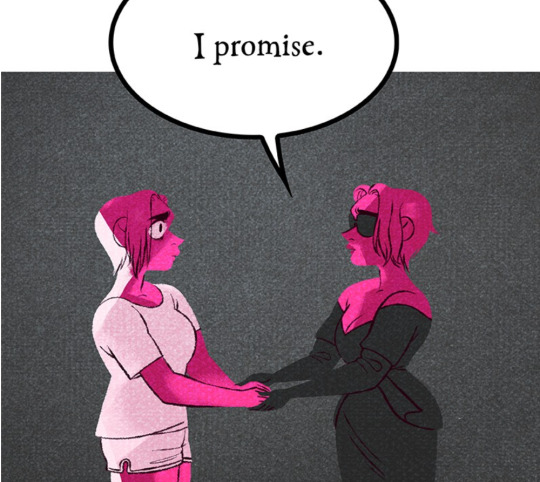
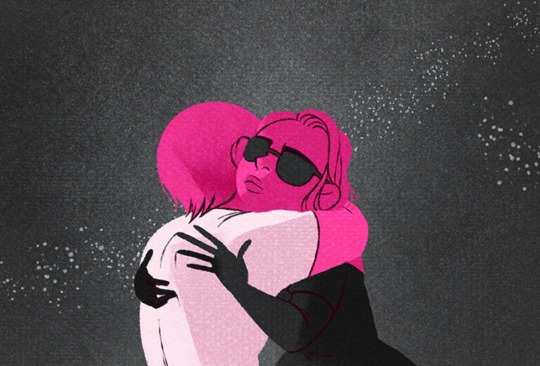
and it's not a bad sequence, or a problematic one; the issue is that persephone has not done any of the work to get to this point.
and by work, i'm talking about therapy, about sitting down and talking to someone about this on her own terms. she had one therapy session where her assault was tacked into the last five to ten minutes of the session; there is no indication she's ever gone back. she's been confronted on her assault - hades, hera, artemis, eros, and hermes have all found out about it without persephone telling them, or wanting to tell them, and hephaestus is aware (which it seems persephone does not know) because he deleted the photos of her assault. hera and hephaestus literally saw her assault in those photos. all of those people and instances are outside of persephone's control; she has never, not once, told any of her friends or her husband of what happened to her of her own choice. in at least three of those instances, she had to comfort the other person who is finding out about her trauma.
and that leads to another issue, which is that persephone has categorically refused to bring apollo to justice. in the past, when apollo had leverage over her, and she was still coming to terms with what happened to her, it was understandable that persephone didn't want anyone to know what happened. the problem is that in the time between her rape and current time, apollo has tried to kill one of her close friends, brought demeter to zeus in exchange for persephone's hand, attempted to kill the king of the gods, and is now weaponizing the deadly winter to become king. at least three members of the olympians know persephone was assaulted, including the queen of the gods. persephone has witnesses and backup and power, and she is still not using it to put apollo away.
so this promise to protect herself, to protect the nineteen year old girl who was alone with a monster - it rings a little too hollow for me. because persephone isn't protecting herself, she's running from herself. she's running from who she used to be and what she once was and what led her to that point. and as so many abuse victims can attest to, running often feels like the easiest thing, and the most protective thing. but at some point, you have to stop running, because it isn't protecting you - it's wearing you down.
persephone doesn't need to run anymore, and as much as i like to trounce this comic and all the narrative choices, i say this with a lot of compassion and remorse: this isn't protecting herself, and i want better for her.
#anti lo#anti lore olympus#abuse ment /#assault ment /#i recognize this issue hits differently for everyone#and there are likely people who do not agree and i fully 1000% understand#this is arguably a more personal take than most of my other posts so i ask respectfully that comments / tags show kindness to everyone#this plot obviously has a LOT of elements and issues i hate and scream problematic#but honestly this scene just made me really sad#like girl ... why are you alone when you call him :(#and to depict apollo as half dressed in some kind of weird sultry vibe#like they're on equal flirtatious ground#man ...
70 notes
·
View notes
Text
I'm a NATLA defender now, tbh. I think more people will grow to appreciate its good parts more as time goes on. I'm of course waiting to see how they wrap everything up and I'm not immune to its flaws, but I think people are so blinded by everything not being The Exact Same as the original cartoon than they're not appreciating its good parts. It's an adaptation, a companion, it's not a replacement to the original.
#atla#natla#natla positivity#i just started straight up crying when aang saw gyatso so i cannot saw i do not like this show#i also do not agree on the take I've seen saying this is avatar paw patrol?#like have you seen this show? have you seen them burning people ALIVE in the first episode?#did you see the scene of bumi who has gone crazy over the years for having to make horrible decisions about how to save his city#and being angry at aang for it?#did you see ozai playing zuko and azula against each other?#katara blaming herself for her mother's death?#like these topics are not dumbed down at all sorry#they're complex topics that we're being shown head on#that's not to say that original atla dumbed stuff down obviously it's an incredibly intelligent and mature show#but this show also shows the mature themes of the consequences of war in its own way
57 notes
·
View notes
Text
Treatise on why No, the doctor just giving the narrator of Fight Club (full name) his requested sleep medication or sending him to therapy would not have Fixed Him
Firstly, saying giving him the insomnia meds would’ve fixed him ignores the reason he has insomnia in the first place. He is so deeply upset by his place in society that he literally cannot sleep. Drugging him to sleep would not change that. That, of course, is the easy, quick response.
But with regard to therapy? The biggest flaw is that it ignores a central tenet of the book. Part of what tortures the narrator and drives him to invent Tyler is that his feelings about this collective, systemic issue are constantly reduced to a Just Him thing. His seatmates ask what his company is. He’s the only one upset at the office. He gets weird looks if he says the truth of what he does. People will do anything in their power to pretend he is the issue, as an individual, because it is far scarier to consider the full implications of the systemic issues implied by what he is saying. Everyone treats it as if the issue is him, so he goes insane. He does anything to get someone to say, holy shit, that’s fucked up, what you’re a part of is wrong. In an attempt to feel any sort of vague sympathy and catharsis, he goes to support groups to pretend to be dying, because then at least people don’t habitually blame him for his anguish.
Saying therapy would fix him ignores that his problems are not individual. They are collective. It’s the reason the entire story resonates with people! Something deeply, unignorably wrong with society, where people would rather blame you for bringing it up than try and address it, because it feels impossible. I don’t blame people for this, really, because it IS scary. It’s terrifying to sit and feel like you’ve realized there’s something deeply, deeply wrong, but if you say something, people will get mad at you since it’s so baked into everything around you. Or, even if they agree, it’s easier to deal with the dissonance by pretending it’s individual.
And it’s not like that’s not the purpose therapy and medications largely serve, anyway. Getting into dangerous territory for this website, but ultimately, the reason the narrator was seeking medication was because it’s a bandaid. A very numbing bandaid. For these very large, dissonance causing problems, therapy does very little. Medications do what they always have, and distract you with numbness or side effects. It’s a false solution. He is seeking an individualized false solution because he has been browbeaten with the idea that this is an issue with him alone, when it's plainly clear it's not.
Don't get me wrong. Obviously he has something wrong with him. But it's a product of his situation. It is a fictional exaggeration of a very real occurrence of mental illness provoked by deep unconscionable dissonance and anguish. There is a clear correlation between what happens and his mental state and his job and how isolated he is.
The thing is, even if he were chemically numbed, I do think he would’ve lost it regardless. Many people on meds find they don’t fix things. For reasons I’ll get into, but in this case because even if numbed or distracted, once you’ve learned about deep, far reaching corruption in society, it’s very hard to forget. Especially if, in his case, you literally serve as the acting hand of this particular variety. He’s crawling up the walls.
So why do people say this? Well, it's funny I guess. Maybe the first time or whatever. But also, often, they believe it, to a degree. Maybe they've just been told how effective therapy and meds are for mental illness, they believe wholeheartedly in The Disease Model of Mental Illness, maybe they themselves have engaged with either and have considered it successful. Maybe they or someone they know has been 'saved' by such treatments.
But in all honesty.... What therapy can help with is mentality, it's how you approach problems. For issues on a smaller scale, not meaning they are easier to deal with my any degree, but ones that are not raw and direct from deep awareness of corruption; these are things that can be worked through if you get lucky and get an actually good therapist who helps build up your resiliency. But when your issue is concrete, something large and inescapable? It's useless. At best it can help you develop coping mechanisms, but there is a limit for that. There is a point where that fails. To develop the ability to handle something like this requires intense development of a comfort with ambiguity and dissonance and being isolated and a firm positioning of your purpose and values and and belief in wonder and all the other shit I ramble about. The things that the narrator lacks, which lead him to taking an ineffectual death knell anarchist self-destruction path. Therapy, where the narrator is, full of the knowledge of braces melted to seats and all the people that have to allow this to happen? It fails.
And meds — meds are a fucking scam. We know the working mechanism of basically none of them, the serotonin receptor model was made up and paid its way into prominence. We have very little evidence they're any better than placebo, and they come with genuinely horrific side effects. Maybe you got lucky. I did, on some meds. On others? I don't remember 2018. The pharmaceutical industry is also known for rampant medical ghostwriting, and for creating 'off-label' uses for drugs that have gained too many protests in their original use, then creating a cult of use to then have 'grassroots' campaigns for it to be made a label use (ie, legitimize their ghostwritten articles with guided anecdotes).
The DSM itself is basically a marketing segregation plot. It's an attempt to legitimize the disease model by isolating subgroups of symptoms to propose individualized treatments for subgroups that are not necessarily all that separate. But if the groups exist, you can prescribe more and different medications, no? Not to mention, if you use the disease model, you can propose that these diseases are permanent, or permanent until treated, considered more and more severe to offset and justify the horrific side effects of the medications. Do you know why male birth control doesn't really exist? Same reason. They can justify all the horrible side effects for women, because the other option is pregnancy. For men, it's nothing.
And they're not bothering to invent new drugs without side effects. When they invent new drugs it's just because the last one got too bad of a name, or they can enter a new market. Modern drugs don't work any better than gen1 drugs. They still have horrific side effects. At best, the industry will shit out studies saying the old one was flawed (truth) so they can say this new gen will be better (lie). They're doing it with ssris right now.
Fundamentally, the single proposed benefit of any of these drugs is that they numb you. To whatever is torturing you. It's harder to be depressed if you can't feel it, or if you just can't muster the same outrage. Of course, there is people who find that numbness to be helpful, or worth it. But often, it's stasis. For the people who have problems that can be worked on, it serves as a stopgap to not actually work on said problems. The natural outcome of the disease model is stagnation for those whose need is to develop skills and resiliency. It keeps them medicalized and dependent on the idea that they're diseased and incapable. Profitable. Stuck in the womb.
I’ve been there. It’s easier, to wallow, and resist growth because it’s difficult and painful and unfair and cruel and you can think of five billion reasons to justify your languishing. But don’t listen to anyone who tells you you’re just permanently damaged, no matter how nicely they word it, no identity or novel pathologization, no matter how many benefits they promise, especially if they swear up and down some lovely expensive medications with little solid backing and plentiful off-label usage and side effects that’ll kill you. Some days it feels like they want us all stuck in pods, agoraphobic and addicted to the ads they feed us to isolate the markets for the drugs they’ve trained us to beg them to pump us with. Polarization making it as easy as flashing blue light for go, red like for stop, or vice versa. I worry about the kids, for fucks sake. That’s a bit dark and intense, and I apologize. But I want you (generic) to understand, there is a profit motive. Behind everything. And they do not mean well. They do not care about your mental health or your rights or your personhood or your growth. They care about how they can profit off of you.
For those struggling with immovable, society problems, like the narrator grappling with how his job fits into and is accepted by society while his rejection and horror in the face of it does not, it can work about as well as any other drug addiction. Your mileage may vary. From what I've seen, recovering from being on prozac for a long time can be worse than alcohol. They put kids on this shit. They keep campaigning for more. Off label, again. A pharmaceutical company’s favorite thing to do has to be to spread rumors of someone who knows someone who said an off label use of this drug helps with this little understood condition. Or, in the case of mental illness, questionably defined condition. And like, damn, I know I'm posting on the 'medicalization is my identity' website so no one will like all this and has probably stopped reading by now, but yall should be exposed to at least one person who doubts this stuff. Doesn't just trust it. Because I mean, that's the thing right?
It's so big. What would it mean, for this all to be true? Yeah, everyone says pharmaceutical companies are evil and predatory and ghostwriting, but to think about what that really entails. Coming back to the book, everyone knows the car lobby is huge and puts dangerous vehicles through that kill people. What does it mean if the car companies all hire people to calculate the cost of a recall and the cost of lawsuits? No one wants to think about the scale that means for people allowing it or the systems that have to be geared towards money, not safety like they say. Hell, even Chuck misses the beat and has the narrator threaten his boss with the Department of Transportation. And shit, man, if every company is doing this, you think Transportation doesn't know? That they give a fuck? You're better off mailing all the evidence to the news outlets and hoping they only character assassinate you a little bit as they release the news in a way that says it's all the fault of little workers like you, not the whole system. Something something, David McBride, any whistleblower you feel like, etc.
So I don't blame you, if your reaction is "but but but, that can't be right, people wouldn't do it, they wouldn't allow it" or just an overwhelming feeling of dread that pushes you to deny all of this and avoid thinking about it. Just know, that's in the book. That's all the seatmates on the flights. That's all his fellow officemates. It's easier to pretend, I know.
But think about, how the response fits in with the themes of the book. The story, as a movie too. What drives the narrator’s mental breakdown? How would you handle being in his position? How would you handle being his seatmate? It’s easy to say you’d listen. But have you? Have you had any soul wrenching betrayals of how you thought society worked? How about a betrayal by the thing that promised to be the fix of the first? Can you honestly say you wouldn’t follow that gut instinct, saying follow what everyone says, that person must just be crazy, evil, rude, cruel, whatever it is that means you can set what they said aside?
For a lot of people, they can do that, I guess. Set it aside. Reaching that aforementioned state of managing to cope with the dissonance and ambiguity and despair is very hard. The narrator made the Big Realization, but he couldn’t cope. He self-destructed. Even when people don’t make the big realization consciously, they’re already self-destructing. It’s hard to escape it when it feels easier than continuing anyway. When it feels like the only option,
Would therapy fix the narrator of Fight Club? Would meds fix the narrator of Fight Club? No. He knows too much. All meds will do, by the time he’s in the psych ward, is spiritually neuter him. A silly phrase, but really. Take the wind out of his sails.
Is he fixed if he doesn’t try to blow up town? If he just shuts up and settles in and stops costing money? If he still can’t cope with the things he’s unearthed? Do you see how this is a commentary in a commentary in a commentary?
Fight Club is an absolutely fascinating story because of this. The fact that it addresses the fallout of knowing. The isolation. The hopelessness. The spiral that results from a lack of hope. This is, I think, what resonates most with people, even if not consciously. Going insane because you’ve discovered something you wish you could unknow. It’s a classic horror story. Should our society be lovecraftian evil? I don’t think so.
Do I think changing it will be easy? No. Lord knows a lot exists to push people who make these sorts of Realizations towards feelings of individuality and individualized solutions and denial and other distractions and coping methods. And to prevent people who make One realization from expanding on it and considering further ramifications. Fight Club itself gets into this; the isolation of men being a strict part of the role society shapes for their sex leaves them very vulnerable to death fetishes, in a sense, and generally towards self destructive violence. It helps funnel them away from substantial change and towards ineffectual change. Many things, misogyny, racism, serve to keep people isolated from one another, individualized, angry, and impossible to work with. Market segregation; god knows even appealing on those fronts has become such a classic ploy that companies do it now, the US military frames its plundering that way, etc.
I’ve wandered a bit but ultimately, my point is this: Fight Club is a love letter to the horrors of critical thinking, and the importance of not falling into the trap of self destruction and hopelessness in the face of it. The latter is why Tyler was an anarchoterrorist instead of anything useful. The latter is why it was a death cult. It’s important to work through the horrors of critical thinking so you can do it, and stand on the other side ready to believe in each other. It’s worth it.
#fight club#my writing#uh. sorta#If you disagree with me it's fine btw. That's a given for me but I realize that's not usual for this website#my big desire is always to provoke thought and get people to think about why they think things#not necessarily to get them to agree with me. though obviously like any person i enjoy that#it was nice to type this out#also#aside from the prozac withdrawals mention and my own experience w memory loss (hilariously not even the most major of my beefs with the#medical industry! or even just the mental health industry! but its an easy nonoffensive one so#anyway i kept it nonspecific because if you go specific it becomes easier for people to just go 'oh well its That that's the problem and i#dont need to reflect at all on my drug/condition/issue/etc'#which ppl will anyway ofc. but yk#maybe theyll find it easier to ignore without the horrific specific examples but i want to leave it broad because 1. doing research and#going past the first thing you find and confirmation bias stuff is good 4 u#second. it's better imo to leave it more open for people to try and apply it broadly#whew ANYWAY#a bonafide Rant#i shouldve put#anti psychiatry#in the first few tags. i havent really looked on tumblr to see what the community 4 that is like on here because it feels like an oxymoron#on this website#but im sure it probably exists even if its used for smth else#(please change)
40 notes
·
View notes
Text
the thing that pisses me off about the sasuke retrieval arc is. there was no reason whatsoever for tenten not to be there. not in-universe and not from a meta perspective. it makes zero sense to leave her out and it makes shikamaru look like an idiot
#naruto#naruto crit#tenten#nara shikamaru#sasuke retrieval team#''oh but shikamaru didn't know tenten'' yeah well neji did. neji knew tenten#hell even lee showed up and he'd literally just gotten out of surgery#i can understand the logic behind every other girl getting left out even if i don't agree with it#shino not being there also makes sense bc he was off doing something with his dad#obviously sasuke wasn't an option#also kiba chouji naruto and neji are ALL close combat fighters. shikamaru was their only mid-long range guy#and what he could do with that was incredibly limited#tenten has the most flexible skillset range-wise there was zero reason to leave her out
36 notes
·
View notes
Text
I don't know if anyone else in the whump community has read 'A Constellation of Vital Phenomena' by Anthony Marra but it is genuinely a really good book and also has some of the best depictions of torture and its aftermath that I have read in fiction.
I wanted to share some of my favourite quotes, hopefully without too many spoilers as it is out of context, but maybe skip this post if you don't want to know anything at all going in.
To give a brief summary, the book centres around the lives of people in Chechnya during the first and second war between the Russian government (Feds) and the separatist rebels. The main story focuses on a man (Akhmed) who is trying to save his neighbour's daughter from being killed by the Feds after her father is taken away in the middle of the night. He does this by taking her to a hospital where he then volunteers. One of the people in his village (Ramzan) becomes an informer for the Feds after being tortured, and this is explored in the excerpts below.
‘Information the Feds would torture them for was written here on the walls for all to see. It was well understood among the men that the Feds had as much sense as two bricks smashed together. It was also understood that pain, rather than information, was the true purpose of interrogation.'
'During his first detention in the landfill, in 1995, in the first war, he had refused to inform. They had wrestled down his trousers, shown him the bolt cutters, and still he had said no. Screaming, thrashing, with his manhood half severed, he had said no. He had done that, and now he was ready to start saying yes.'
'He would have confessed everything, but they didn't ask, weren't interested, threatened to cut out his tongue and put pliers to his teeth if he spoke one more fucking word. Electric wires were wound around his fingers. A car battery was drained into his bones. God might have been watching, but it wasn't God's finger on the battery switch. The interrogating officers didn't speak. Instead he was an instrument they played, performing a duet, and in their own way they conversed through his sobs. They both wore very shiny shoes. That was all he would remember.'
'He had trouble walking, He had forgotten torture could be so exhausting. The new interrogator, the one with less shiny shoes, held him upright, using his whole body as a crutch, and helped him walk. He carefully wiped Ramzan's forehead with a handkerchief before opening the door to the next room.'
'The interrogator with less shiny shoes crouched behind him. His hands were wet. Ramzan promised everything, and the interrogator, like the parent of a child too old to believe in ghosts, watched him with disappointment, his clear eyes saddened by Ramzan's sincerity. The interrogator took off his jacket, rolled up his sleeves, laid the live wires on Ramzan's chest and mapped the border of their shared humanity. Ramzan offered his soul. He begged to be enslaved. The known universe contracted to the limits of the cement floor, and on it, the interrogator was both man and deity, prophet and god. By ten o'clock the interrogator with less shiny shoes asked his first question. By eleven the electrical wires were unwound from Ramzan's fingers. By noon he was allowed to dress. By one he was on the FSB payroll. He kept thanking the interrogator with less shiny shoes.'
‘Greed didn’t motivate his informing, at least not primarily; primarily he informed by necessity, to survive, for his love and hate and above all awe of the power wielded by the interrogating officer with less shiny shoes.'
'That was his greatest fear. Could he stay silent? Could he withstand what awaited him? He told himself that his love for the girl should fortify him against any torture, but this, like so much of what he told himself, was a lie. After all, he was squeamish at the sight of blood, what would he say when lying in a puddle of his own? But he saw no other way. He would pray for the strength to stay silent, for a quick heart attack, and leave the rest to God.' (This is Akhmed POV)
'When they threatened to beat me, I said nothing, Akhmed. When they threatened to beat me, I said nothing. When they threatened to electrocute me, I said nothing. When they threatened to castrate me, I said nothing. I said nothing, Akhmed. Whatever you think of me, you remember that once I said nothing when a wiser man would have sung. And the interrogators, they couldn't believe it. They called in others to examine me. I was there on the floor, and above their faces were dark ovals silhouetted by the ceiling lights. They had beaten me hard and I couldn't hear right, but I kept saying no, with every breath I had. The main reason they let me go, the only reason they didn't shoot me right there was out of perverse respect, some sort of professional courtesy. But I wish they had shot me, Akhmed, because the good part of me died there, and all this, everything since, has been an afterlife I'm trying to escape.'
‘I knew what was coming. I knew it never stops. They put a shame inside you that goes on like a bridge with no end, the humiliation, the fucking humiliation of knowing that you are not a human being but a bundle of screaming nerve endings, that the torture goes on even when the physical hurt quietens. People treated me differently when I came back the first time.'
#torture#whump#s talks#a constellation of vital phenomena#idk what else to tag this with tbh#electricity torture#beating#I don't think it counts as gore tbh but like viewer discretion is advised#I really like this portrayal tbh#because like torture sort of is effective for the feds but they dont actually care about the truth#ramzan is mostly just giving up people who gossipped about him and then just whoever he is told he has to invent evidence on#and like obviously there are characters who do not choose to inform#akhmed does not give up the girl we know this#but yeah idk it's intersting to me#like torture as something functional but also completely empty of meaning#also I just really like the writing#and the way it talks about the aftermath and the trauma of it that alters ramzan forever in some ways#but it's also clear that it's not just the torture that made him do it like#he is a complex character and he is also trying to protect his dad who relies on insulin to survive#and he also agreed to inform to save his friend who had his fingers cut off
33 notes
·
View notes